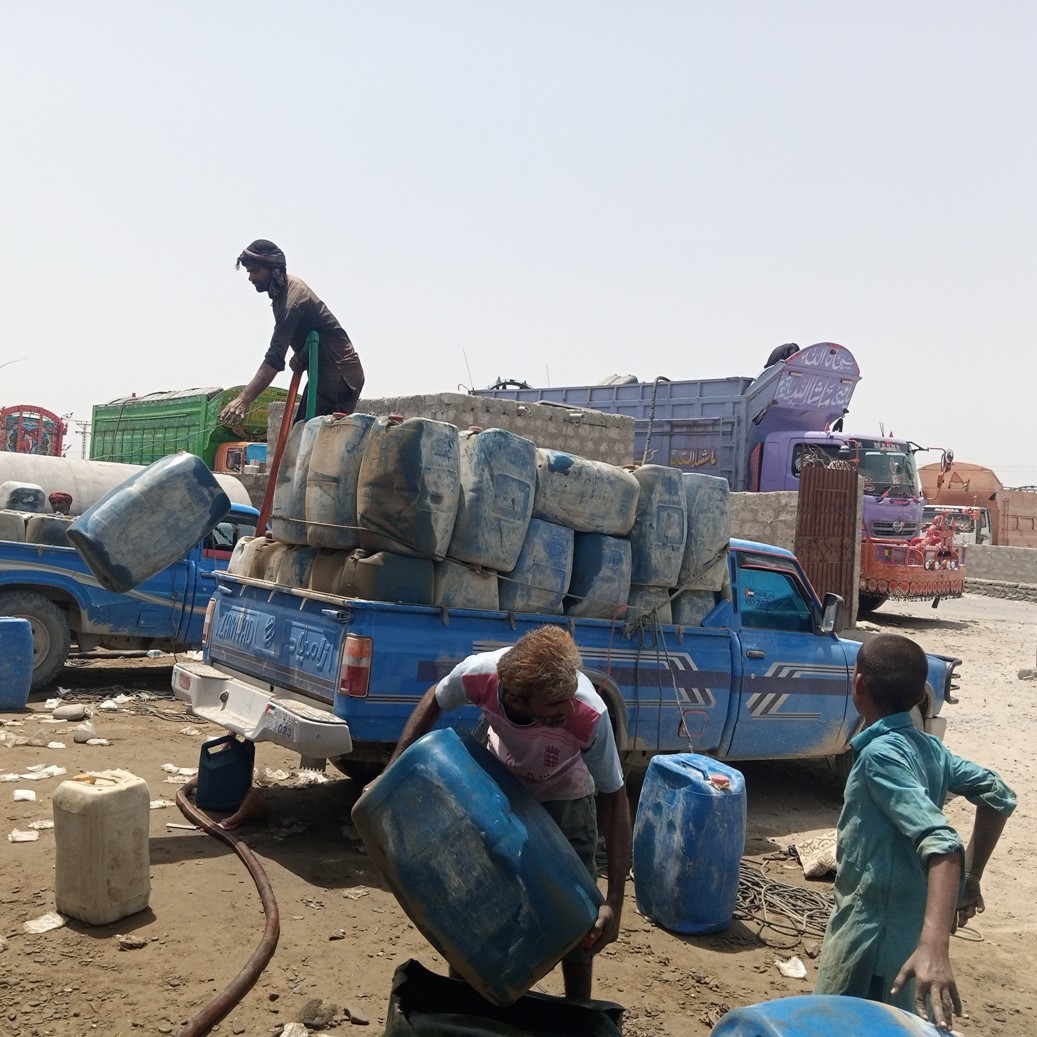The Jusik Cross area in Balochistan’s Kech district is a hub for purchasing and selling imported oil (diesel and petrol) from Iran. A significant presence of blue-coloured Zamiyad pick-up trucks, locally known as Zimbad, can be observed in this area. These trucks transport oil from Iran to Balochistan and then distribute it to various parts of the province.
Numerous buyers gather at Jusik Cross, supporting the local economy with hotels, auto repair shops, grocery stores, and other businesses reliant on this trade.
Numerous oil depots have been set up in this area where the owners purchase oil from Zamiyad vehicle drivers and distribute it to different locations using larger vehicles called “backs.” These oil depots, around 400 in number, are not only found in the Jusik Cross band throughout the Kech district.
The depot owners are the ones who set the price for the oil imported from Iran. The oil is being purchased from Zamiyad individuals in Jusik Cross at Rs37,000 rupees per drum. A drum contains 210 litres of oil, serving as the primary unit of measurement for oil in this region.
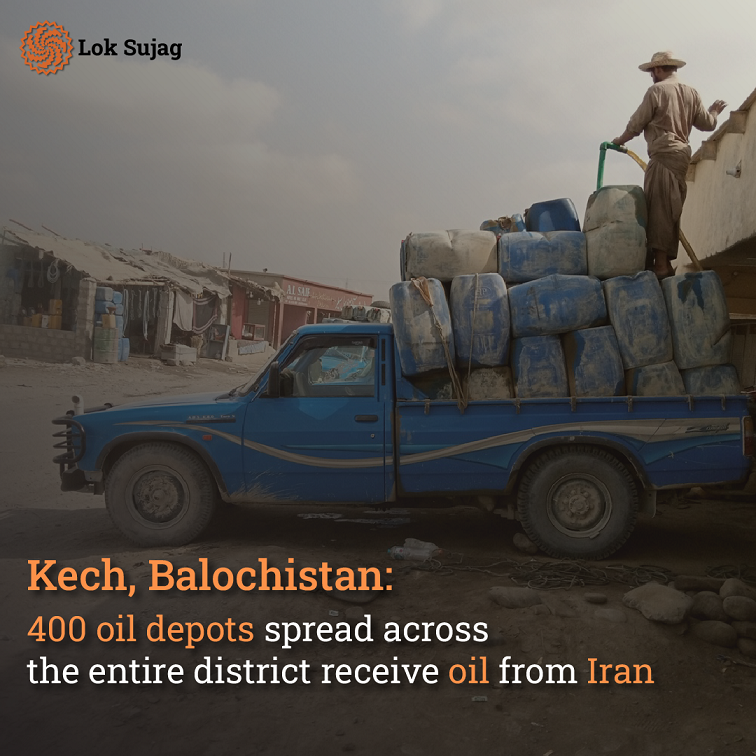
Elahi Bakhsh, a 30-year-old resident of the Hoshab area in Kech, has arrived at Jusik Cross to sell oil. He has parked his car and is currently waiting for customers. Two potential buyers are interested in purchasing oil from him, but Elahi Bakhsh finds the offer of Rs37,000 unacceptable.
He explains to the customers that he bought 4,000 litres of diesel at Rs33,000 per drum. Additionally, he had to purchase a token worth Rs20,000 to transport the oil. He paid Rs15,000 to the driver and Rs5,000 to the cleaner. Furthermore, he spent Rs15,000 on travel. Apart from these costs, he also factored in the expense of 140 litres of petrol to cover the 180 km distance from the Pak-Iran border to Kech. Considering all these expenses, if he sells diesel at 37,000 rupees per drum, he won’t have any savings.
Four years ago, Elahi Bakhsh worked as a labourer in Dubai. However, upon learning about the emerging business opportunities at the Pak-Iran border, he decided to return. Upon his arrival, with the assistance of a friend, he purchased a second-hand Zamiyad car and began selling oil imported from Iran.

Elahi Bakhsh encounters a significant challenge in his work: his vehicle is not registered for oil trading, so he must purchase tokens each time to transport oil. These tokens are issued by the office of the Deputy Commissioner of Kech, and acquiring them is not easy. Sometimes, he has to make multiple visits to the office and pay a substantial amount of money to obtain the required token.
The administration has halted the registration of additional oil tankers, so obtaining a token is now the only option to transport oil. The cost of the token is directly linked to the price of oil. When the price of oil rises, the token prices also increase. On numerous occasions, I have had to pay two lakh rupees to acquire a token.
In April 2019, the government of Pakistan decided to fence the 950-kilometre-long Pakistan-Iran border due to security concerns. As a result, illegal trade from various locations along the border stopped. The administration allowed border crossings solely at Abdoi; currently, all trade between Iran and Kech takes place through this route.
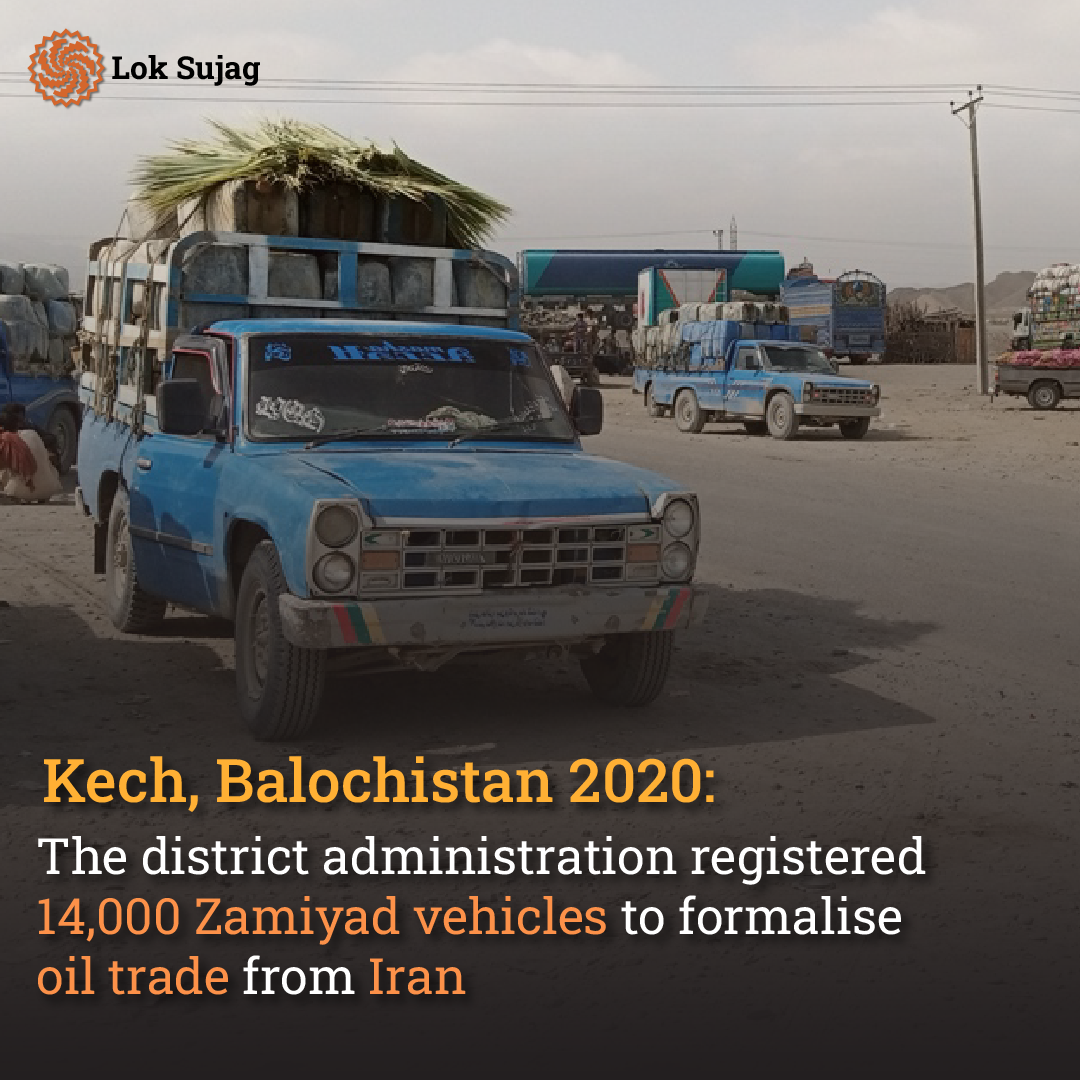
Qamber Kaif, the owner of a diesel depot at Jusik Cross, reveals that the decision to close the border was sudden and not communicated to the Zamiyad owners or the depot owners. Consequently, the oil tankers remained stranded at the Pakistan-Iran border for one and a half months, resulting in the tragic deaths of four labourers due to hunger and thirst. Faced with these dire circumstances, the stranded individuals initiated a protest that persisted for several days.
Eventually, the administration responded by issuing tokens to facilitate the movement of oil tankers from the border, establishing a more formalised process.
In 2020, the Kech district administration decided to register these vehicles to bring more regulation to the oil trade. As a result, around 14,000 Zamiyad vehicles have been registered up to this point. Except for Sundays, the administration publishes a list of 600 vehicles authorised to transport oil from Iran on a rotating basis. However, the actual number of vehicles crossing the border daily exceeds this limit.
The leader of Border Awami Tehreek, an organisation advocating for the rights of individuals engaged in this trade, informs Lok Sajag that approximately 1,200 oil tankers cross the border daily. Of these, 600 vehicles are registered, while the rest obtain tokens or special permits for conducting this trade.
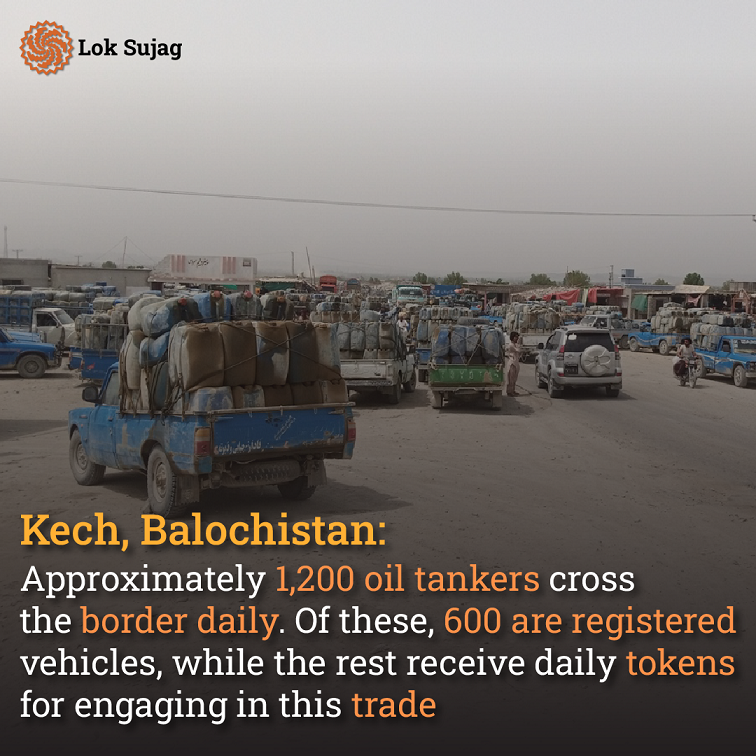
Khalid claims that the administration has turned token issuance into a profitable “business” for themselves, resulting in substantial profits. Given his challenges within this trade, he addressed the issue of tokenisation during a meeting with the Deputy Commissioner. The official acknowledged that tokens are indeed provided to owners of unregistered vehicles to obtain oil. However, he clarified that the actual daily count of such vehicles is 350 instead of 600, as previously stated.
The administration has currently ceased registering additional vehicles for this trade route. A token is now necessary to utilise any unregistered vehicle in this trade. Addressing this matter, Aqeel Karim, the Additional Deputy Commissioner of Ketch, explains that the owners of Zamiyad vehicles are opposed to further registrations. Their concern stems from the fear that increased registrations might invite outsiders to engage in this business, potentially encroaching upon their rights.
However, Khalid argues that the administration is solely focused on generating significant profits through brokers under the pretext of tokens. Given this situation, it is unlikely that the administration would encourage further vehicle registrations.
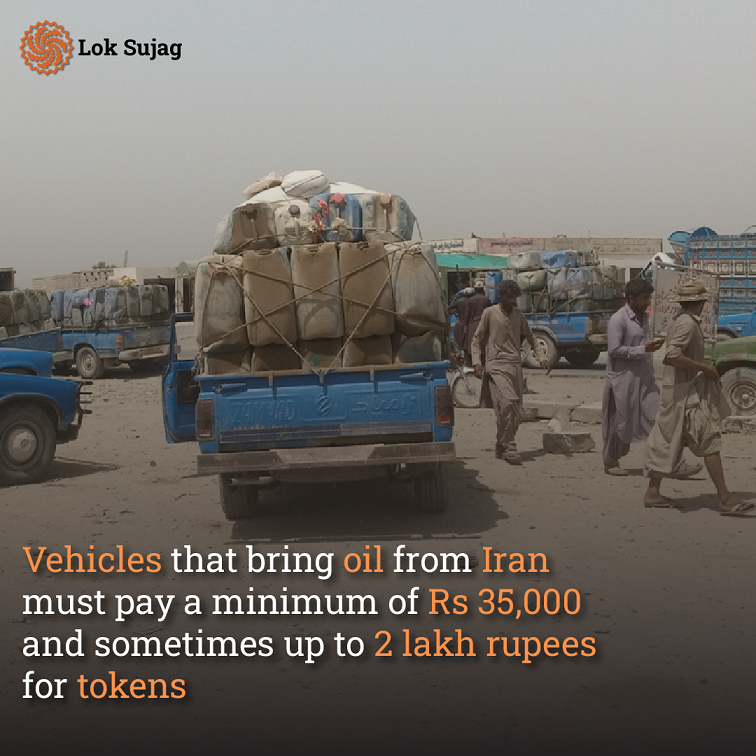
A broker informs Lok Sujag that a minimum of Rs35,000 is paid for a single token.
Waseem Safar, the President of the Zamiyad Vehicle Owners’ Association, known as ‘Zamiyad and Two Thousand Association,’ is demanding the resumption of free trade at the border, as previously practised. He also urges the reopening of closed border crossings in the name of security.
“When the Haq Du movement took place in Gwadar, we actively participated. We called for the withdrawal of border security from the FC, transferring it to the district administration, and abolishing the token system. Chief Minister Abdul Qudous Bizenjo visited our protest camp and agreed to these demands. As a result, the border security was returned to the district administration. However, despite these achievements, the token system could not be eliminated.”
Also Read
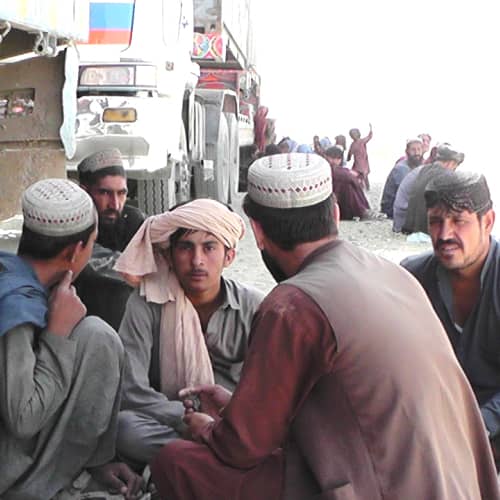
Chaman border closure: hundreds of Afghans and goods worth multi-million rupees stranded on both sides
Regarding the closure of border crossings other than Abdoi, the Additional Deputy Commissioner explains that both the Iranian government and Pakistani security forces have their respective concerns about reopening these crossings.
While Pakistan expressed interest in opening the Kapakpar and Jalgi passages, Iran did not agree. Conversely, Iran is willing to open the Chek Pass, but Pakistan’s security forces have apprehensions regarding it.
Waseem further highlights that both registered and unregistered vehicle owners are being taken advantage of under the guise of tokens. Registered vehicle owners express concerns that they are restricted to bringing fuel across the border only once a month. Additionally, they are required to purchase tokens for each trip they make.
Published on 17 Jul 2023
